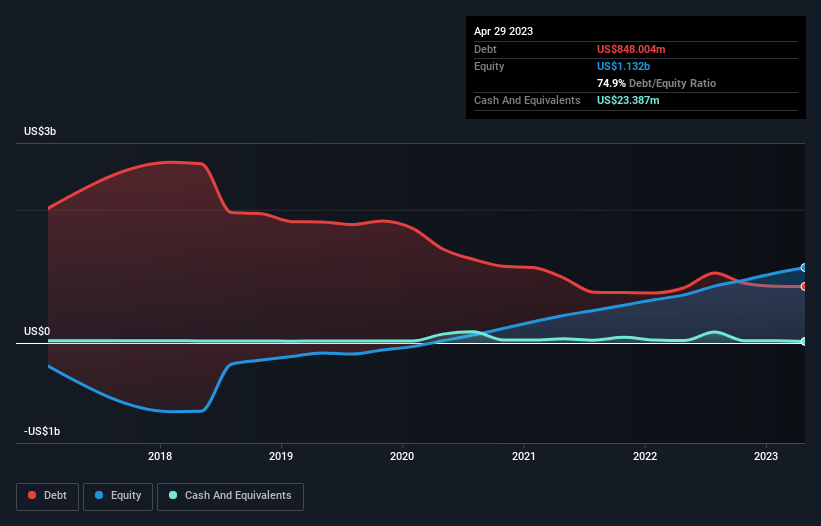- United States
- /
- Food and Staples Retail
- /
- NYSE:BJ
Here's Why BJ's Wholesale Club Holdings (NYSE:BJ) Can Manage Its Debt Responsibly

Howard Marks put it nicely when he said that, rather than worrying about share price volatility, 'The possibility of permanent loss is the risk I worry about... and every practical investor I know worries about.' When we think about how risky a company is, we always like to look at its use of debt, since debt overload can lead to ruin. We note that BJ's Wholesale Club Holdings, Inc. (NYSE:BJ) does have debt on its balance sheet. But is this debt a concern to shareholders?
What Risk Does Debt Bring?
Generally speaking, debt only becomes a real problem when a company can't easily pay it off, either by raising capital or with its own cash flow. If things get really bad, the lenders can take control of the business. While that is not too common, we often do see indebted companies permanently diluting shareholders because lenders force them to raise capital at a distressed price. Of course, the upside of debt is that it often represents cheap capital, especially when it replaces dilution in a company with the ability to reinvest at high rates of return. When we think about a company's use of debt, we first look at cash and debt together.
View our latest analysis for BJ's Wholesale Club Holdings
What Is BJ's Wholesale Club Holdings's Net Debt?
The chart below, which you can click on for greater detail, shows that BJ's Wholesale Club Holdings had US$848.0m in debt in April 2023; about the same as the year before. However, because it has a cash reserve of US$23.4m, its net debt is less, at about US$824.6m.

A Look At BJ's Wholesale Club Holdings' Liabilities
Zooming in on the latest balance sheet data, we can see that BJ's Wholesale Club Holdings had liabilities of US$2.62b due within 12 months and liabilities of US$2.74b due beyond that. Offsetting this, it had US$23.4m in cash and US$217.9m in receivables that were due within 12 months. So its liabilities outweigh the sum of its cash and (near-term) receivables by US$5.12b.
This deficit is considerable relative to its market capitalization of US$8.26b, so it does suggest shareholders should keep an eye on BJ's Wholesale Club Holdings' use of debt. Should its lenders demand that it shore up the balance sheet, shareholders would likely face severe dilution.
We measure a company's debt load relative to its earnings power by looking at its net debt divided by its earnings before interest, tax, depreciation, and amortization (EBITDA) and by calculating how easily its earnings before interest and tax (EBIT) cover its interest expense (interest cover). The advantage of this approach is that we take into account both the absolute quantum of debt (with net debt to EBITDA) and the actual interest expenses associated with that debt (with its interest cover ratio).
BJ's Wholesale Club Holdings has a low net debt to EBITDA ratio of only 0.83. And its EBIT covers its interest expense a whopping 15.4 times over. So you could argue it is no more threatened by its debt than an elephant is by a mouse. And we also note warmly that BJ's Wholesale Club Holdings grew its EBIT by 19% last year, making its debt load easier to handle. When analysing debt levels, the balance sheet is the obvious place to start. But it is future earnings, more than anything, that will determine BJ's Wholesale Club Holdings's ability to maintain a healthy balance sheet going forward. So if you want to see what the professionals think, you might find this free report on analyst profit forecasts to be interesting.
But our final consideration is also important, because a company cannot pay debt with paper profits; it needs cold hard cash. So the logical step is to look at the proportion of that EBIT that is matched by actual free cash flow. Over the most recent three years, BJ's Wholesale Club Holdings recorded free cash flow worth 55% of its EBIT, which is around normal, given free cash flow excludes interest and tax. This cold hard cash means it can reduce its debt when it wants to.
Our View
Happily, BJ's Wholesale Club Holdings's impressive interest cover implies it has the upper hand on its debt. But, on a more sombre note, we are a little concerned by its level of total liabilities. Looking at all the aforementioned factors together, it strikes us that BJ's Wholesale Club Holdings can handle its debt fairly comfortably. Of course, while this leverage can enhance returns on equity, it does bring more risk, so it's worth keeping an eye on this one. There's no doubt that we learn most about debt from the balance sheet. But ultimately, every company can contain risks that exist outside of the balance sheet. These risks can be hard to spot. Every company has them, and we've spotted 1 warning sign for BJ's Wholesale Club Holdings you should know about.
If you're interested in investing in businesses that can grow profits without the burden of debt, then check out this free list of growing businesses that have net cash on the balance sheet.
Valuation is complex, but we're here to simplify it.
Discover if BJ's Wholesale Club Holdings might be undervalued or overvalued with our detailed analysis, featuring fair value estimates, potential risks, dividends, insider trades, and its financial condition.
Access Free AnalysisHave feedback on this article? Concerned about the content? Get in touch with us directly. Alternatively, email editorial-team (at) simplywallst.com.
This article by Simply Wall St is general in nature. We provide commentary based on historical data and analyst forecasts only using an unbiased methodology and our articles are not intended to be financial advice. It does not constitute a recommendation to buy or sell any stock, and does not take account of your objectives, or your financial situation. We aim to bring you long-term focused analysis driven by fundamental data. Note that our analysis may not factor in the latest price-sensitive company announcements or qualitative material. Simply Wall St has no position in any stocks mentioned.
About NYSE:BJ
BJ's Wholesale Club Holdings
Operates membership warehouse clubs on the eastern half of the United States.
Adequate balance sheet with acceptable track record.
Similar Companies
Market Insights
Community Narratives



